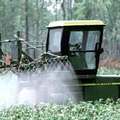 美國布希政府先前頒布一項關於殺蟲劑使用法規,允許未經諮詢聯邦野生生物機構,仍可將殺蟲劑用於瀕絕物種及棲地上,聯邦法官就此議題廢除政府該項法規。對政府提起訴訟的保育團體成功地指控,該法規將使殺蟲劑廠商不易正視其產品對瀕絕動植物的傷害作用。
美國布希政府先前頒布一項關於殺蟲劑使用法規,允許未經諮詢聯邦野生生物機構,仍可將殺蟲劑用於瀕絕物種及棲地上,聯邦法官就此議題廢除政府該項法規。對政府提起訴訟的保育團體成功地指控,該法規將使殺蟲劑廠商不易正視其產品對瀕絕動植物的傷害作用。
過去5年,美國地方法院法官約翰‧考艮爾(Coughenour)已作了兩次不利聯邦機關的裁決,表示聯邦機構未能遵守瀕危物種法(Endangered Species Act,簡稱ESA)中對市面上登記販售的殺蟲劑的約束。
在8月24日的裁決中,法官駁回行政裁決,且回復先前對受保護的野生動植物的較嚴格標準。考艮爾法官發現新的法規會「無可避免地導致瀕危物種蒙受傷害」。
在瀕危物種法的規範下,美國環境保護署(EPA)需確保:殺蟲劑的使用不可阻礙瀕臨絕種物種的存活及生機。這項法律規定,環保署需與美國魚類及野生動植物機構及國家海洋魚類中心的專家,共同研商出適合適用的科學,以盡到保護瀕危物種的義務。
先前的法令將野生動植物專家拒於決策之外,允許環保署中殺蟲劑案的承辦者,而非野生動植物專家,讓這些化學製品對應受保護物種的種種影響,做出關鍵性的決策。
柯林頓時期為美國魚類及野生動植物機構主任的傑米‧瑞派伯‧克拉克(Jamie Rappaport Clark),現為「野生物保衛者」組織(Defenders of Wildlife)執行副總,也是這個事件的原告之一。他提到這個有缺陷的科學及不完全的分析,是環保署為符合其與聯邦野生動植物專家研商內容的義務,長期忍受下不情不願產生的結果。
該新法規取消了瀕危物種法案中查核與平衡機制,使新法規讓農產業者及其他企業在使用高量有毒的殺蟲劑上更加便利,卻漠視其對環境的威脅。而科學家、保育專家和國會議員皆反對該項法規修改,因為殺蟲劑以成為白頭鷹、鮭魚、青蛙和海龜等瀕危物種減少的因素之一。
A federal judge has overturned new Bush administration rules that would have allowed use of pesticides on endangered species and their habitats without consultation with federal wildlife agencies. Plaintiff conservation groups successfully argued that the rules made it easier for pesticide makers to ignore the effects of their products on endangered plants and animals.
For the second time in the past five years, U.S. District Judge John Coughenour ruled against federal agencies for failing to follow the Endangered Species Act in licensing pesticides for sale.
In a ruling August 24, the judge set aside the administration's rules, and restored prior standards that provided greater protection to protected wildlife and plants. Judge Coughenour found that the rules would "actually result in harm to listed species."
Under the Endangered Species Act (ESA), the U.S. Environmental Protection Agency (EPA) is required to ensure that the use of pesticides will not set back the chances of survival and recovery of species threatened with extinction. The law requires the EPA to consult with wildlife specialists in the U.S. Fish and Wildlife Service and National Marine Fisheries Service to apply the best available science to meeting this obligation to protect endangered species.
The rules would have cut wildlife scientists out of the decision making, allowing pesticide managers at EPA, not wildlife experts, to make key decisions about the impact these chemicals have on protected species.
Jamie Rappaport Clark, director of the U.S. Fish and Wildlife Service in the Clinton administration, and now executive vice president of Defenders of Wildlife, one of the s in this case, said that faulty science and unsound analysis has been the result of the longstanding reluctance of the EPA to conform to its obligation to consult with federal wildlife experts.
By eliminating the checks and balances built into the Endangered Species Act through inter-agency consultation, the new rule would have made it easier for agribusiness and other industries to use highly toxic pesticides despite the risks to the environment. Scientists, conservationists, and members of Congress had opposed the rule change because pesticides have been a factor in the decline of species as diverse as bald eagles, salmon, frogs, and sea turtles.



